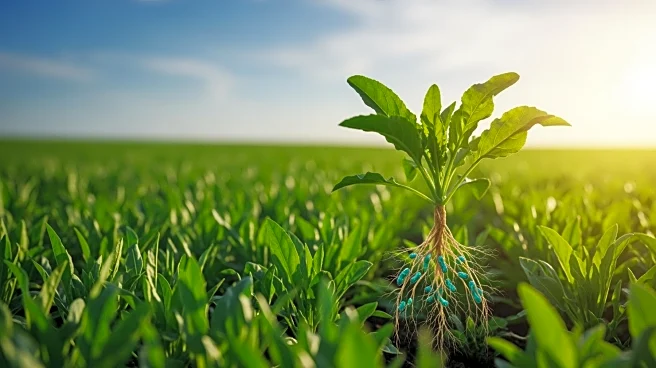What's Happening?
The agricultural microbials market is projected to grow from USD 7.50 billion in 2025 to USD 14.30 billion by 2030, driven by a strong CAGR of 13.8%. This growth is fueled by increasing demand for residue-free
and sustainable crop solutions. Farmers are increasingly adopting microbial-based fertilizers, pesticides, and biostimulants to enhance nutrient uptake and soil biodiversity while reducing reliance on synthetic chemicals. Technological advancements, such as AI-powered strain discovery and synthetic biology, are accelerating the adoption of these solutions. The Asia-Pacific region is expected to lead this growth, supported by government subsidies and sustainability-focused policies.
Why It's Important?
The expansion of the agricultural microbials market signifies a major shift towards sustainable farming practices, which is crucial for addressing global food security and environmental challenges. By reducing chemical residues in food production, these solutions align with consumer preferences for healthier and more sustainable products. This shift also supports regenerative agriculture, enhancing soil health and biodiversity. The market growth presents opportunities for agribusinesses and startups to innovate and expand their portfolios, potentially leading to increased investment and job creation in the sector.
What's Next?
As the market grows, stakeholders including governments, agribusinesses, and farmers are likely to increase investments in research and development to optimize microbial products. Policies promoting microbial adoption, such as subsidies and tax incentives, are expected to expand, particularly in regions like Asia-Pacific and Europe. The integration of AI and genomics in microbial R&D will continue to enhance product efficacy and scalability, potentially leading to new partnerships and mergers within the industry.
Beyond the Headlines
The rise of agricultural microbials highlights the intersection of technology and sustainability in modern agriculture. This trend may lead to ethical considerations regarding the use of biotechnology in food production and its impact on traditional farming practices. As the industry evolves, there will be a need to balance innovation with ecological and cultural values, ensuring that technological advancements benefit all stakeholders equitably.











